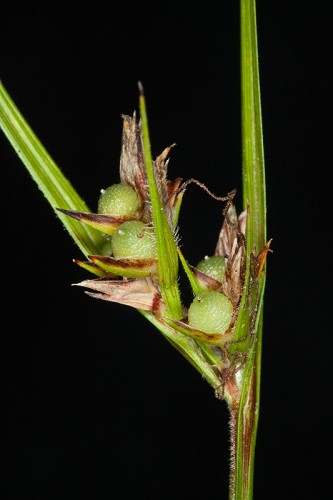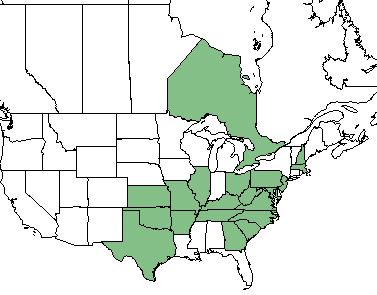Difference between revisions of "Scleria pauciflora"
(→Conservation and Management) |
|||
| Line 1: | Line 1: | ||
{{italic title}} | {{italic title}} | ||
| + | Common names: fewflower nutrush <ref name= "USDA"> [https://plants.usda.gov/core/profile?symbol=CEAM USDA Plant Database]</ref> | ||
<!-- Get the taxonomy information from the NRCS Plants database --> | <!-- Get the taxonomy information from the NRCS Plants database --> | ||
{{taxobox | {{taxobox | ||
| Line 31: | Line 32: | ||
==Ecology== | ==Ecology== | ||
===Habitat=== | ===Habitat=== | ||
| − | ''S. pauciflora'' is found in habitats such as wet and dry pine flatwoods, pine savannas, and depression meadows. <ref name= "Weakley"> Weakley, A. S. (2015). Flora of the Southern and Mid-Atlantic States. Chapel Hill, NC, University of North Carolina Herbarium.</ref> | + | ''S. pauciflora'' is found in habitats such as wet and dry pine flatwoods, pine savannas, and depression meadows. <ref name= "Weakley"> Weakley, A. S. (2015). Flora of the Southern and Mid-Atlantic States. Chapel Hill, NC, University of North Carolina Herbarium.</ref> Specimens have been taken from boggy riverbanks, slashpine woods, pine flatwoods, disturbed pine scrub, open old field, oak-pine woods, longleaf pine savanna, roadside ditches, and wet rocky soils. <ref name = "FSU herbarium"> URL: http://herbarium.bio.fsu.edu. Last accessed: June 2018. Collectors: R.F Thorne, R.A. Davidson, Loran C. Anderson, R.K. Godfrey, William Reese, Paul Redfearn, John Nelson, Robert Kral, Mabel Kral, A.H. Curtiss, J. N. Triplett, Steve L. Orzell, Edwin Bridges, Wilson Baker, Ann Johnson, J. E. Fairey, Windler Keenan-Lombardo, Norlan Henderson, A.E. Radford, john W. Thieret, Sidney McDaniel, Randy Haynes, D. Windler, R. Stastny, D.S. Correll, Helen B. Correll, Craig A. Hanson. States and counties: Florida (Liberty,, Franklin, Putnam, Calhoun, Gulf, Dixie, Hernando, Duval, Taylor, Washington, Wakulla, Jefferson, Leon, Jackson) Georgia (Thomas, Tattnall) Maryland (Baltimore) Missouri (Hickory) North Carolina (Lee) Louisiana (Washington) Texas (Van Zandt)</ref> |
<!--Natural communities, human disturbed habitats, topography, hydrology, soils, light, fire regime requirements for removal of competition, etc.--> | <!--Natural communities, human disturbed habitats, topography, hydrology, soils, light, fire regime requirements for removal of competition, etc.--> | ||
<!--===Phenology===--> <!--Timing off flowering, fruiting, seed dispersal, and environmental triggers. Cite PanFlora website if appropriate: http://www.gilnelson.com/PanFlora/ --> | <!--===Phenology===--> <!--Timing off flowering, fruiting, seed dispersal, and environmental triggers. Cite PanFlora website if appropriate: http://www.gilnelson.com/PanFlora/ --> | ||
Revision as of 18:56, 19 June 2018
Common names: fewflower nutrush [1]
| Scleria pauciflora | |
|---|---|

| |
| Photo by John Gwaltney hosted at Southeastern Flora.com | |
| Scientific classification | |
| Kingdom: | Plantae |
| Division: | Magnoliophyta - Flowering plants |
| Class: | Liliopsida - Moncots |
| Order: | Poales |
| Family: | Cyperaceae |
| Genus: | Scleria |
| Species: | S. pauciflora |
| Binomial name | |
| Scleria pauciflora Muhl. ex Willd. | |

| |
| Natural range of Scleria pauciflora from USDA NRCS Plants Database. | |
Contents
Taxonomic Notes
Synonym: S. ciliata
Variety: S. paciflora var. caroliniana
Description
S. pauciflora is a perennial graminoid of the Cyperaceae family that is native to North America. [1]
Distribution
S. pauciflora is found in the majority of the western United States; Georgia, South Carolina, Virginia, Maryland, Delaware, New Jersey, West Virginia, Pennsylvania, Massachusetts, New Hampshire, Ohio, Tennessee. Kentucky, Illinois, Missouri, Arkansas, Kansas, Oklahoma, and Texas, as well as Ontario, Canada. [1]
Ecology
Habitat
S. pauciflora is found in habitats such as wet and dry pine flatwoods, pine savannas, and depression meadows. [2] Specimens have been taken from boggy riverbanks, slashpine woods, pine flatwoods, disturbed pine scrub, open old field, oak-pine woods, longleaf pine savanna, roadside ditches, and wet rocky soils. [3]
Conservation and Management
S. pauciflora is classified as endangered in Massachusetts and Michigan. It is considered threatened in Ohio, Pennsylvania, and Rhode Island. [1]
Cultivation and restoration
Photo Gallery
References and notes
- ↑ 1.0 1.1 1.2 1.3 USDA Plant Database
- ↑ Weakley, A. S. (2015). Flora of the Southern and Mid-Atlantic States. Chapel Hill, NC, University of North Carolina Herbarium.
- ↑ URL: http://herbarium.bio.fsu.edu. Last accessed: June 2018. Collectors: R.F Thorne, R.A. Davidson, Loran C. Anderson, R.K. Godfrey, William Reese, Paul Redfearn, John Nelson, Robert Kral, Mabel Kral, A.H. Curtiss, J. N. Triplett, Steve L. Orzell, Edwin Bridges, Wilson Baker, Ann Johnson, J. E. Fairey, Windler Keenan-Lombardo, Norlan Henderson, A.E. Radford, john W. Thieret, Sidney McDaniel, Randy Haynes, D. Windler, R. Stastny, D.S. Correll, Helen B. Correll, Craig A. Hanson. States and counties: Florida (Liberty,, Franklin, Putnam, Calhoun, Gulf, Dixie, Hernando, Duval, Taylor, Washington, Wakulla, Jefferson, Leon, Jackson) Georgia (Thomas, Tattnall) Maryland (Baltimore) Missouri (Hickory) North Carolina (Lee) Louisiana (Washington) Texas (Van Zandt)